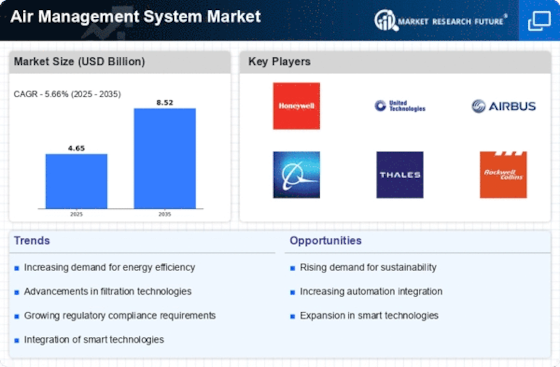Market Analysis
In-depth Analysis of Air Management System Market Industry Landscape
To some extent, supply and demand in the Air Management System industry are influenced by various factors that include additional company trends. Among other things, these dynamics depend on growing concerns about sustainability. As the world becomes more conscious of climate change risks as well as air pollution, there's an escalation in requirements for energy-efficient ventilation systems that comply with eco-standards. Thus, technological advances also play a pivotal role in shaping the market dynamics of this industry. Such systems have been transformed with the inclusion of smart technologies such as IoT-integrated sensors and process automation. Technologically savvy firms offering such systems would thus have a competitive edge over those that do not since their offerings can enable real-time monitoring and control of air quality levels. The availability and accessibility of these technologies are projected to increase because they will become cheaper, thereby influencing the future market dynamics even further. Government regulations and policies significantly contribute to the market dynamics of the Air Management System industry. The design and functionality of air management systems are affected by strict regulations for emission control, indoor quality improvement, and energy savings. Economic conditions directly influence market dynamics in the air management system. Air management solutions are demanded based on growth in the economy, industrialization levels, and progress in infrastructural development. The air management system market is dynamic because of competition and the presence of multiple players. To remain competitive among rivals, enterprises invest heavily in research work that is aimed at the continuous development of new product features that will permit them to maintain an advanced position over others in this niche. Energy efficiency advances, integration with other building systems, and overall performance of the system serve to distinguish these firms from others, thereby capturing wider segments. Consumer behaviors and preferences are some of the changing factors that affect the Air Management System Market. A need for indoor air quality-oriented air management systems is emerging since informed customers who understand health matters and concerns for the environment want them more than ever before. Growing concern about sustainability among consumers has increased demand for green products such as energy-efficient smart air conditioners, fueling further advancement of technology in this sector. Global events or crises may significantly shape market dynamics within the Air Management System industry. This was evidenced during COVID-19 when there was a lot of emphasis on ventilation and good indoor air that can prevent airborne diseases like the coronavirus virus, hence leading to more focus on purification devices or ventilation equipment, creating room for new entrants while being a major driver behind dynamism here.

















Leave a Comment